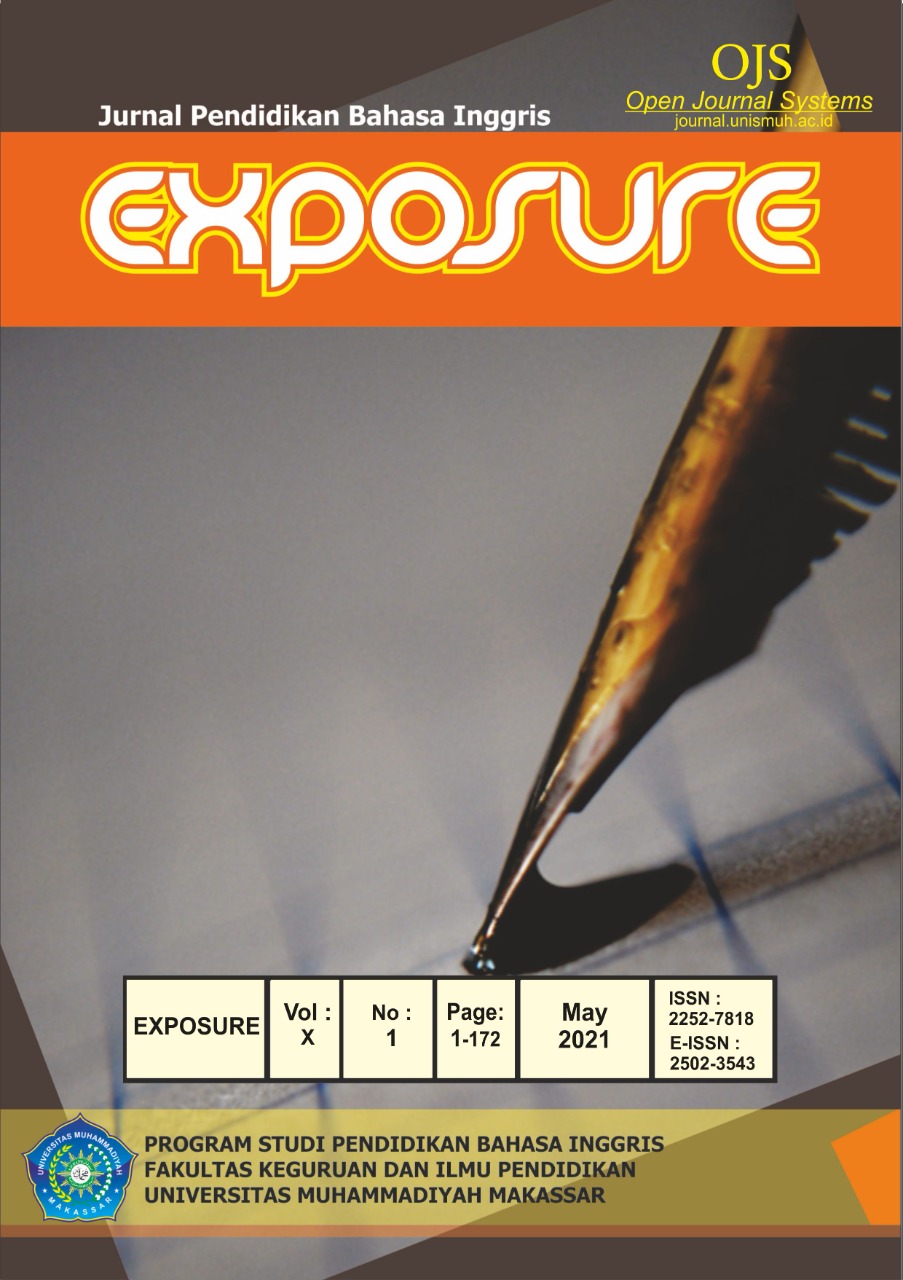“THE MISSION” STRATEGY APPLICATION TO ELEVATE STUDENTS’ SPEAKING PERFORMANCE
DOI:
https://doi.org/10.26618/exposure.v10i1.5000Keywords:
Speaking Performance, English Learners, The Mission StrategyAbstract
The English Department students of Muhammadiyah University of Parepare faced some difficulties in performing speaking. For instance, the students feel anxious and worried about making mistakes, and they lack language and communicative knowledge. Therefore, to help students overcome their problems and enhance their communicative competence, this research was conducted to determine whether applying “The Mission” strategy could elevate English Education Department students' speaking performance. The researcher in this study conducted a pre-experimental method. The population was the first semester of English Department Students. The researcher used the total sampling method in deciding the research sample. The instruments used in collecting the data were informal interview tests, also known as “Question and Answer”. The result of the data found was analysed by using SPSS Application. The results of the research showed that the students’ speaking performance after giving treatment was significantly improved. It was proved by the data of the students’ mean score post-test was higher than in pre-test (77,00 > 37,77). It indicates that the elaboration of Task-based Instruction with “The Mission” strategy can empower students’ in performing speaking.
References
Agustin, Y. (2015). Kedudukan Bahasa Inggris Sebagai Bahasa Pengantar Dalam Dunia Pendidikan. Deiksis, 3(04), 354–364. https://doi.org/10.30998/DEIKSIS.V3I04.440
Al-Seghayer, K. (2014). The Four Most Common Constraints Affecting English Teaching in Saudi Arabia. International Journal of English Linguistics, 4(5), 17–26. https://doi.org/10.5539/ijel.v4n5p17
Aouatef, B. (2015). The Main Psychological factors affecting Learners ’ Oral Performance (Mohamed Kheidir University of Biskra). Retrieved from http://archives.univ-biskra.dz/bitstream/123456789/5962/1/BELEGDAIR Aouatef.pdf
Arifin, W. L. (2017). Psychological Problems and Challenge In EFL Speaking Classroom. REGISTER JOURNAL, Language & Language Teaching Journals, 10(1), 29–47. https://doi.org/: http://dx.doi.org/10.18326/rgt.v10i1.29-47
Ariyanti, A. (2016). Psychological Factors Affecting EFL Students’ Speaking Performance. ASIAN TEFL Journal of Language Teaching and Applied Linguistics, 1(1), 77–88. https://doi.org/10.21462/asiantefl.v1i1.14
Brown, H. D. (2001). Teaching by Principles: An Interactive Approach to Language Pedagogy (2nd ed.). https://doi.org/9780130282835
Burkart, G. S. (1998). Document resume. https://doi.org/N/A
Gay, L. R., Mills, G. E., & Airasian, P. (2012). Educational Research: Competencies for Analysis and Application (10th ed.). Retrieved from http://englishlangkan.com/produk/E Book Educational Research L R Gay Pearson 2012.pdf
Jamaluddin, D., Ratnasih, T., Gunawan, H., & Paujiah, E. (2020). Pembelajaran Daring Masa Pandemik Covid-19 Pada Calon Guru : Retrieved from http://digilib.uinsgd.ac.id/30518/
Javaid, M., Haleem, A., Vaishya, R., Bahl, S., & Suman, R. (2020). Industry 4 . 0 technologies and their applications in fi ghting COVID-19 pandemic. Elsevier Science: Diabetes & Metabolic Syndrome: Clinical Research & Reviews, 14(4), 419–422. https://doi.org/10.1016/j.dsx.2020.04.032
Latifa, A., Rahman, A., Hamra, A., Jabu, B., & Nur, R. (2015). Developing a Practical Rating Rubric of SpeakingTest for University Students of English in Parepare , Indonesia. 8(6), 166–177. https://doi.org/10.5539/elt.v8n6p166
Rini, J. E. (2014). English in Indonesia: Its Position Among Other Languages in Indonesia. Beyond Words, 2(2), 19–40. Retrieved from https://media.neliti.com/media/publications/231721-english-in-indonesia-53cc9af4.pdf
Sugiyono. (2015). Metode Penelitian Pendidikan: Pendekatan Kualitatif, Kuantitatif, dan R&D. Bandung: Alfabeta.
Syarifuddin. (2014). Model Penerapan KKNI sebagai Penguatan Mutu Program Studi Pariwisata dan Pendidikan Bahasa Inggris. Gorontalo.
UM Parepare. (2018). Peraturan Akademik UM Parepare. Parepare.
Downloads
Published
Issue
Section
License
Authors who publish with this journal agree to the following terms:
In order to assure the highest standards for published articles, a peer review policy is applied. In pursue of the compliance with academic standards, all parties involved in the publishing process (the authors, the editors and the editorial board and the reviewers) agree to meet the responsibilities stated below in accordance to the Journal publication ethics and malpractice statement.
Duties of Authors:
- The author(s) warrant that the submitted article is an original work, which has not been previously published, and that they have obtained an agreement from any co-author(s) prior to the manuscript’s submission;
- The author(s) should not submit articles describing essentially the same research to more than one journal;
- The authors(s) make certain that the manuscript meets the terms of the Manuscript Submission Guideline regarding appropriate academic citation and that no copyright infringement occurs;
- The authors(s) should inform the editors about any conflict of interests and report any errors they subsequently, discover in their manuscript.
Duties of Editors and the Editorial Board:
- The editors, together with the editorial board, are responsible for deciding upon the publication or rejection of the submitted manuscripts based only on their originality, significance, and relevance to the domains of the journal;
- The editors evaluate the manuscripts compliance with academic criteria, the domains of the journal and the guidelines;
- The editors must at all times respect the confidentiality of any information pertaining to the submitted manuscripts;
- The editors assign the review of each manuscript to two reviewers chosen according to their domains of expertise. The editors must take into account any conflict of interest reported by the authors and the reviewers.
- The editors must ensure that the comments and recommendations of the reviewers are sent to the author(s) in due time and that the manuscripts are returned to the editors, who take the final decision to publish them or not.
Authors are permitted and encouraged to post online a pre-publication manuscript (but not the Publisher’s final formatted PDF version of the Work) in institutional repositories or on their Websites prior to and during the submission process, as it can lead to productive exchanges, as well as earlier and greater citation of published work (see The Effect of Open Access). Any such posting made before acceptance and publication of the Work shall be updated upon publication to include a reference to the Publisher-assigned DOI (Digital Object Identifier) and a link to the online abstract for the final published Work in the Journal.

